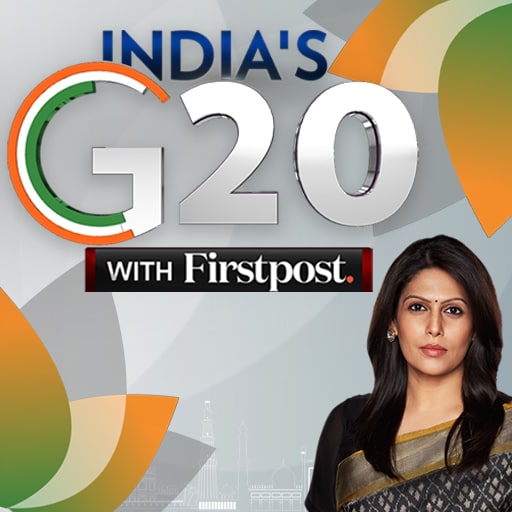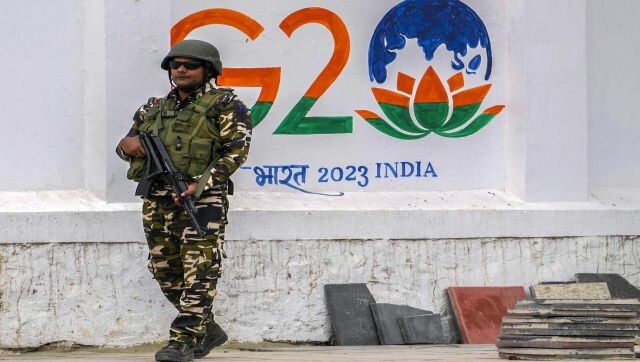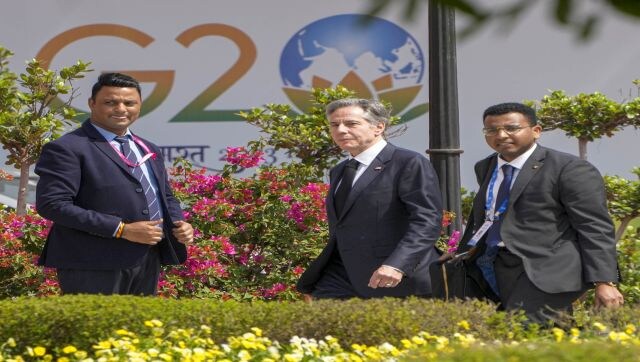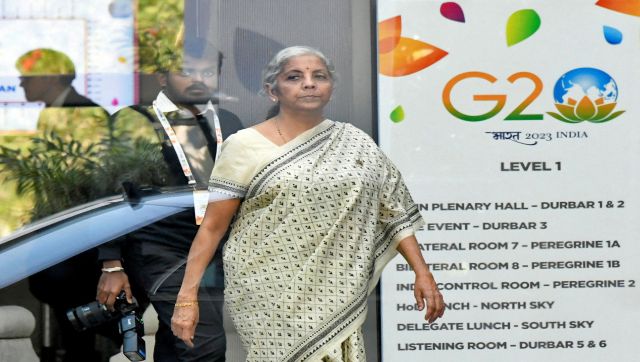India’s G20 presidency crosses the halfway mark: How has it fared so far?
India took over the presidency of the G20 in December 2022 and it will run through until 30 November. As India completes six months of its presidency, we take a look at the significant moments thus far. This includes a 100 meetings, a fiery foreign ministers meet and a consensus on debt language

Delegates ride in a buggy at a G20 meeting venue near Bengaluru. After taking over the presidency in December 2022, India has already held over 100 meetings and halfway through its term. File image/Reuters

India’s weight in the international system is on the rise. And the proof of this is India chairing the important G20 bloc. It was in December 2022 that India, under the leadership of Prime Minister Narendra Modi, assumed the mantle and it will continue until 30 November 2023.
As India took helm of the all-important collective – the G20, comprising 19 countries and the European Union, Prime Minister Narendra Modi said, “India’s G20 presidency is coming at a time of crisis and chaos in the world. The world is going through the aftereffects of disruptive once-in-a-century pandemic, conflicts and lot of economic uncertainty.”
He added, “India is keen to play the role of a leading power —one that sets rules and shapes outcomes — and this Presidency could not have come at a more opportune time for showcasing India’s capabilities.”
Related Articles
We are now halfway into India’s G20 presidency and as the latter half unfolds with attention focused on the summit in Delhi on 9-10 September, we recap the salient and big moments until now.
Hitting the 100 mark
On 17 April, India celebrated a key milestone in its G20 presidency, hosting of the 100th meeting of the grouping. The Meeting of Agricultural Chief Scientists (MACS) in Varanasi was the 100th meeting of the grouping.
The meeting addressed the global food security concerns which have been aggravated by the COVID-19 pandemic and climate change. The participants recognised the need for strengthening efforts towards sustainable agriculture and food systems by leveraging science, technology and innovations.
At the meet, the representatives also lent their support for the launch of Millets And Other Ancient Grains International ReSearcH Initiative (MAHARISHI). As per the Centre, this initiative will supplement the efforts undertaken under the International Year of Millets 2023 (IYoM 2023) program initiated by the United Nations General Assembly (UNGA).
When India took charge of the G20 bloc, it had announced that it would hold over 200 G20-related meetings in around 60 cities across India, the widest geographical spread in any G20 Presidency.
And till date, it has crossed the 100 mark with eyes now turning to the Capital for the key meetings to be held on 9 and 10 September.
Catch our full coverage of India’s G20 presidency
Explained: What is the G20 and how has it led in times of global crises?
Why India’s G20 presidency is significant
Who are G20 Sherpas and what is their role in the G20 Summit?
What is G21? Why has PM Modi been pushing for it?
A ‘historic’ tourism meet
India’s G20 presidency is seeing a flurry of meetings being held – from north to south and east to west, covering the length and breadth of the nation. One of these meets – the third G20 Tourism Working Group Meeting – was held in Jammu and Kashmir’s Srinagar amid heightened security.

The meetings from 22 to 24 May saw around 60 delegates gather in Srinagar. Interestingly, this was the first time a significant international event was held there since the Narendra Modi-led government abrogated Section 370 and split the state into two Union territories.
Also read: G20 meeting in Kashmir: A milestone for peace, progress and global cooperation
The meeting created quite a stir; Pakistan, which is not a G20 member, criticised New Delhi’s decision to hold the meetings in Kashmir, calling it an “irresponsible” move. China did not attend, citing its firm opposition “to holding any kind of G20 meetings in disputed territory”.
The foreign ministers meet in Delhi
Foreign ministers of countries comprising the G20 bloc met in New Delhi on 1-2 March for the foreign ministers’ meeting. As the war waged on, Russia’s foreign minister Sergey Lavrov, US secretary of state Antony Blinken, China’s Qin Gang, and British foreign minister James Cleverly attended the meet, which drew the attention of the entire world.
The meet saw PM Modi asking the leaders to “rise above [their] differences”. However, a consensus couldn’t be reached as the Western nations, led by US secretary of state Antony Blinken hitting out at Russia over the war in Ukraine, calling on the G20 bloc to ask Moscow to cease hostilities.
“We must continue to call on Russia to end its war of aggression and withdraw from Ukraine for the sake of international peace and economic stability,” Blinken had said at the closed-door meeting, as per Reuters.
In turn, Russia lambasted the West at the G20 talk, blaming it for the global political and economic crises. “A number of Western delegations turned the work on the G20 agenda into a farce, wanting to shift the responsibility for their failures in the economy to the Russian Federation,” Lavrov said, according to Reuters.

Eventually, the meeting chaired by External Affairs Minister S Jaishankar ended with a ‘Chair’s Summary and Outcome Document’. This ‘outcome document’, consisting of 24 paragraphs was agreed upon by all members except Paras 3 and 4, which had references to Russia’s aggression against Ukraine and was opposed by Russia and China.
Dr S Jaishankar later said, “There were differences on Ukraine issue which we could not reconcile.” He, however, added that the meeting was productive and successful as the concerns of ‘Global South were highlighted and accepted by the G20 members. He further admitted that multilateralism is in crisis today in terms of preventing future wars and terrorism.
Money matters
The first ministerial meeting held under the Indian G20 presidency was the meeting of Finance Ministers and Central Bank Governors (FMCBG) held in Bengaluru in the last week of February.
Once again, no official communique but only a Chair Summary cum Outcome Document was released with Ukraine being the biggest stumbling block.

However, the meeting was not inconsequential. The meeting focused on issues relating to international financial architecture, sustainable finance and infrastructure. Rising debt levels affecting developing countries was also an important feature in the discussions. The Chair’s summary stated that it recognises the urgency to address debt vulnerabilities in low and middle-income countries, pointing to the key role played by Multilateral Development Banks (MDBs) in development financing.
The G20 leaders also recognised the need to establish effective anti-money laundering and counter-terrorism financing regulations and oversight of virtual assets, especially to prevent their use in money laundering and terrorism financing, in line with FATF standards.
Future of India’s G20 presidency
India’s G20 presidency comes at a difficult time in the world; the COVID-19 pandemic and the slowing down of the economy and the growing polarisation triggered by the Ukraine conflict.
Despite these hurdles, India has performed quite well so far, particularly in creating an unprecedented buzz across the land about the country’s role in the world.
Ambassador Rajiv Bhatia, Distinguished Fellow, Foreign Policy Studies, Gateway House and a former ambassador, in the Hindustan Times wrote, “With a continuation of diligence, diplomatic nimbleness, political vision, and some more luck, the country should reach its destination successfully, bringing greater glory to India and G20.”
With inputs from agencies
also read

Australian PM Anthony Albanese to attend G20 Leaders' Summit in New Delhi
Albanese will be among the leaders of G-20 nations who are scheduled to attend the summit under India’s presidency in New Delhi this September

India adopted unconventional approach to its G20 Presidency, says EAM Jaishankar
Stating that multiple challenges confront the G20 grouping, External Affairs Minister S Jaishankar said that India adopted an unconventional approach to its Presidency, making it much more connected with people

'India has zero tolerance policy against corruption': PM Modi in G20 Anti-Corruption Ministerial Meeting
The prime minister also mentioned the enactment of the Economic Offenders Act in 2018 under which the Indian government is aggressively pursuing economic offenders and informed about the recovery of assets worth over 1.8 billion dollars from economic offenders and fugitives


